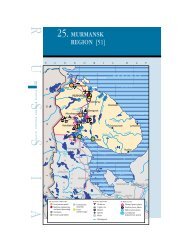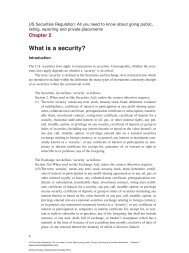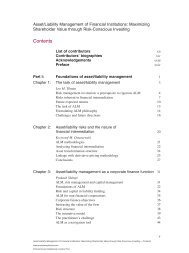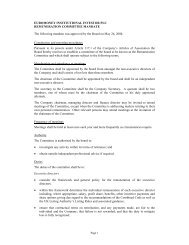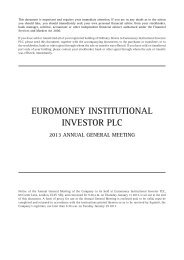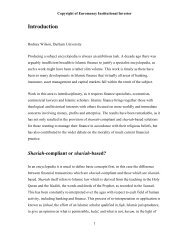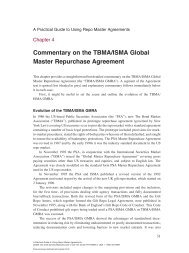Annual Report & Accounts 2012 - Euromoney Institutional Investor ...
Annual Report & Accounts 2012 - Euromoney Institutional Investor ...
Annual Report & Accounts 2012 - Euromoney Institutional Investor ...
You also want an ePaper? Increase the reach of your titles
YUMPU automatically turns print PDFs into web optimized ePapers that Google loves.
<strong>Euromoney</strong> <strong>Institutional</strong> <strong>Investor</strong> PLC <strong>Annual</strong> <strong>Report</strong> and <strong>Accounts</strong> <strong>2012</strong><br />
www.euromoneyplc.com<br />
Notes to the Company <strong>Accounts</strong> continued<br />
1 Accounting policies continued<br />
Deferred taxation is calculated under the provisions of FRS 19 ‘Deferred<br />
Taxation’, and is provided in full on timing differences that result in an<br />
obligation at the balance sheet date to pay more tax, or a right to pay<br />
less tax, at a future date, at rates expected to apply when the timing<br />
differences crystallise based on current tax rates and law. Deferred tax is<br />
not provided on timing differences on unremitted earnings of subsidiaries<br />
and associates where there is no commitment to remit these earnings.<br />
Deferred tax assets are only recognised to the extent that it is regarded as<br />
more likely than not that they will be recovered.<br />
Foreign currencies<br />
Transactions in foreign currencies are recorded at the rate of exchange<br />
ruling at the date of the transaction or, if hedged forward, at the rate of<br />
exchange of the related foreign exchange contract. Monetary assets and<br />
liabilities denominated in foreign currencies are translated into sterling at<br />
the rates ruling at the balance sheet date.<br />
Derivatives and other financial instruments<br />
The company uses various derivative financial instruments to manage its<br />
exposure to foreign exchange and interest rate risks, including forward<br />
foreign currency contracts and interest rate swaps.<br />
All derivative instruments are recorded in the balance sheet at fair value.<br />
Recognition of gains or losses on derivative instruments depends on<br />
whether the instrument is designated as a hedge and the type of exposure<br />
it is designed to hedge.<br />
The effective portion of gains or losses on cash flow hedges are deferred<br />
in equity until the impact from the hedged item is recognised in the<br />
profit and loss account. The ineffective portion of such gains and losses is<br />
recognised in the profit and loss account immediately.<br />
Gains or losses on the qualifying part of net investment hedges are<br />
recognised in equity together with the gains and losses on the underlying<br />
net investment. The ineffective portion of such gains and losses is<br />
recognised in the profit and loss account immediately.<br />
Changes in the fair value of the derivative financial instruments that do<br />
not qualify for hedge accounting are recognised in the profit and loss<br />
account as they arise.<br />
The premium or discount on interest rate instruments is recognised as part<br />
of net interest payable over the period of the contract. Interest rate swaps<br />
are accounted for on an accruals basis.<br />
Liabilities for put options over the remaining minority interests in<br />
subsidiaries are recorded in the balance sheet at their estimated<br />
discounted present value. These discounts are unwound and charged<br />
to the income statement as notional interest over the period up to the<br />
date of the potential future payment. In respect of options over further<br />
interests in joint ventures and associates, only movements in their fair<br />
value are recognised.<br />
Subsidiaries<br />
Investments in subsidiaries are accounted for at cost less impairment. Cost<br />
is adjusted to reflect amendments from contingent consideration. Cost<br />
also includes direct attributable cost of investment.<br />
Trade and other receivables<br />
Trade receivables are recognised and carried at original invoice amount,<br />
less provision for impairment. A provision is made and charged to the<br />
profit and loss account when there is objective evidence that the company<br />
will not be able to collect all amounts due according to the original terms.<br />
Cash at bank and in hand<br />
Cash at bank and in hand includes cash, short-term deposits and other<br />
short-term highly liquid investments with an original maturity of three<br />
months or less.<br />
Dividends<br />
Dividends are recognised as an expense in the period in which they are<br />
approved by the company’s shareholders. Interim dividends are recorded<br />
in the period in which they are paid.<br />
Provisions<br />
A provision is recognised in the balance sheet when the company has a<br />
present legal or constructive obligation as a result of a past event, and it is<br />
probable that economic benefits will be required to settle the obligation.<br />
If it is material, provisions are determined by discounting the expected<br />
future cash flows at a pre-tax rate that reflects current market assessments<br />
of the time value of money and, where appropriate, the risks specific to<br />
the liability.<br />
Share-based payments<br />
The company makes share-based payments to certain employees which<br />
are equity-settled. These payments are measured at their estimated fair<br />
value at the date of grant, calculated using an appropriate option pricing<br />
model. The fair value determined at the grant date is expensed on a<br />
straight-line basis over the vesting period, based on the estimate of the<br />
number of shares that will eventually vest. At the period end the vesting<br />
assumptions are revisited and the charge associated with the fair value<br />
of these options updated. In accordance with the transitional provisions,<br />
FRS 20 ‘Share-based payments’ has been applied to all grants of options<br />
after November 7 2002, that were unvested at October 1 2004, the date<br />
of application of FRS 20.<br />
124






